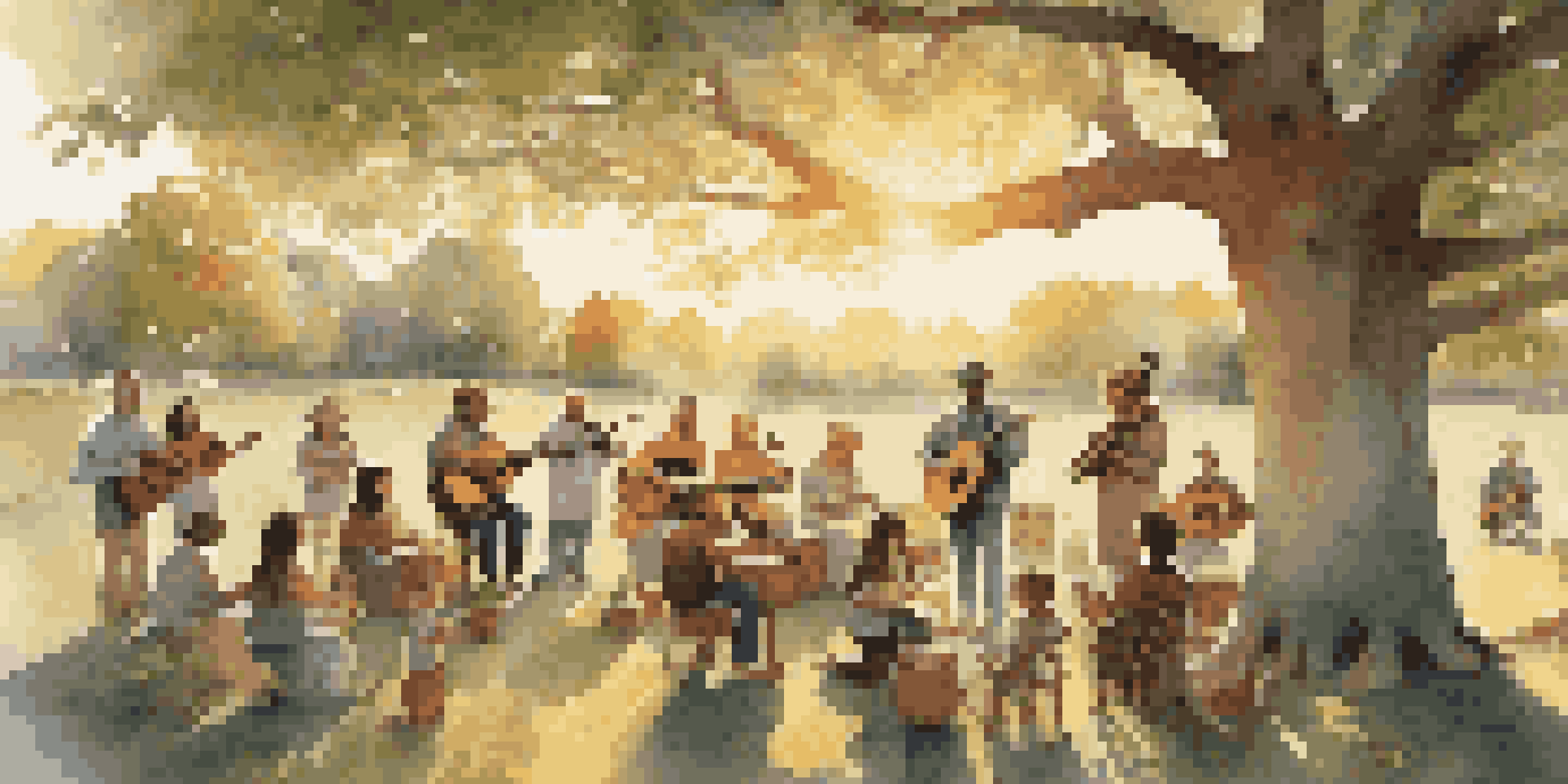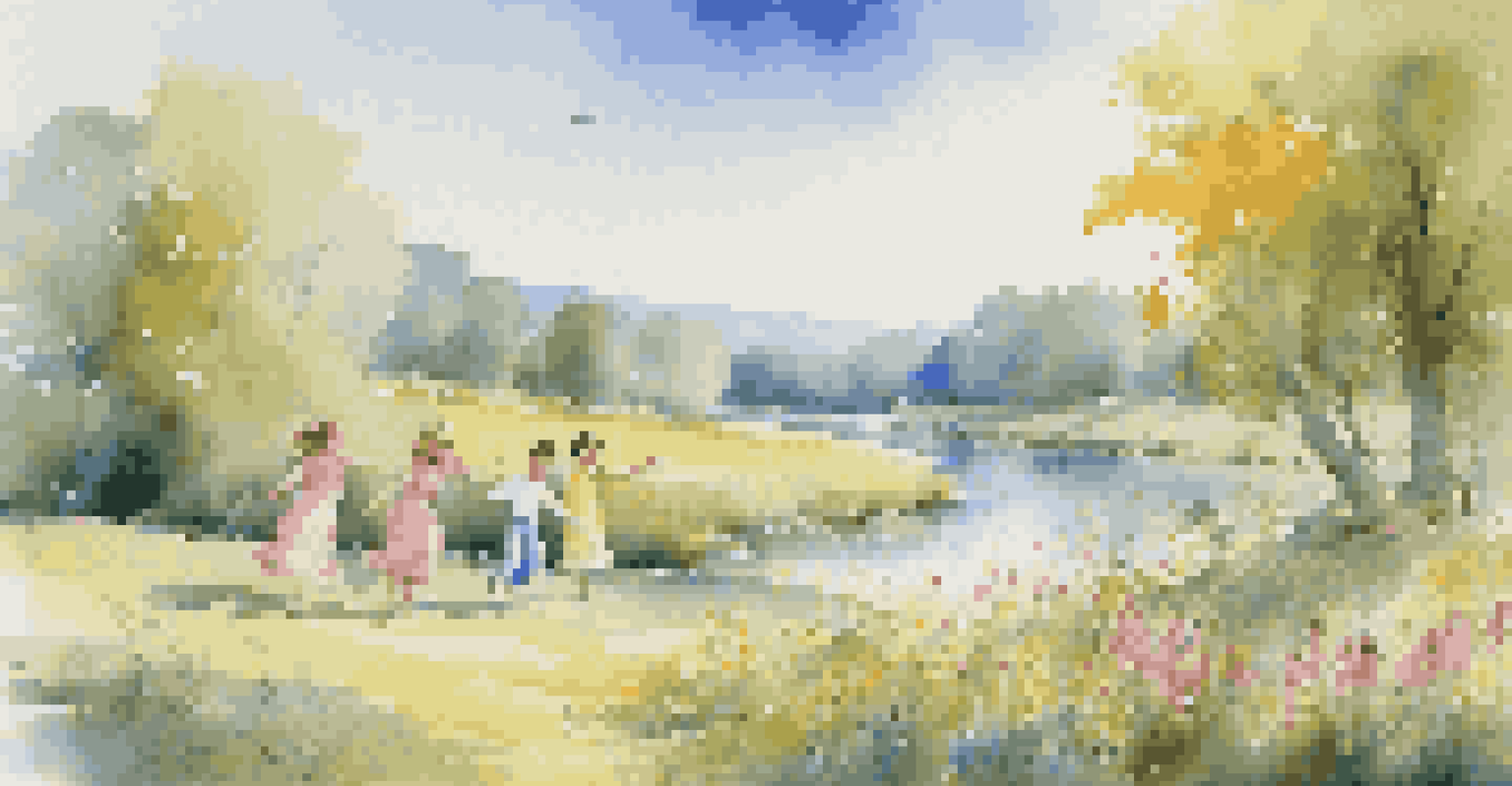Folk Songs and Spirituality: A Connection Through Heritage

The Essence of Folk Songs in Cultural Heritage
Folk songs are rich tapestries woven from the threads of cultural history, often reflecting the experiences, struggles, and joys of everyday life. These songs serve as a collective memory for communities, allowing them to pass down traditions and values through generations. They act as a mirror, showcasing the unique identity and heritage of a people, and can often evoke strong emotional responses that connect listeners to their roots.
Folk music is the voice of the people, capturing their hopes, dreams, and struggles.
As these melodies echo through time, they transcend mere entertainment, becoming vessels of wisdom and storytelling. Much like a family heirloom, folk songs carry with them the stories of those who came before us, linking us to our ancestors and their spiritual beliefs. This connection fosters a sense of belonging and continuity, reinforcing the idea that we are part of something larger than ourselves.
By engaging with folk songs, individuals can tap into a deep well of cultural spirituality that resonates within their own lives. Whether it’s a lullaby sung to soothe a child or a ballad lamenting lost love, these songs encapsulate human emotion and experience. Thus, folk songs become not just art, but a bridge to understanding our shared spiritual heritage.
Spiritual Themes in Folk Music
Folk music often delves into profound spiritual themes, exploring concepts of love, loss, and redemption. These themes resonate universally, allowing listeners to find solace and meaning in the melodies. For example, songs about the changing of seasons often symbolize life's cycles, reflecting the spiritual belief in renewal and hope.

Many folk songs are rooted in the spiritual practices and beliefs of the communities from which they originate. They may recount religious stories or celebrate rituals, reinforcing the connection between music and spirituality. This is particularly evident in the way certain songs are sung during ceremonies, creating a sacred atmosphere that enhances the communal experience.
Folk Songs Reflect Cultural Identity
Folk songs serve as a collective memory for communities, passing down traditions and values while showcasing unique cultural identities.
Moreover, the storytelling aspect of folk music allows for the exploration of moral lessons and philosophical ideas. These narratives often encourage listeners to reflect on their own lives and spiritual journeys, fostering a deeper understanding of their place in the world. Through this lens, folk songs become powerful tools for spiritual exploration and growth.
The Role of Folk Music in Spiritual Gatherings
Folk songs play a pivotal role in spiritual gatherings, uniting individuals through shared melodies and lyrics. In many cultures, these gatherings serve as an opportunity for communal worship and reflection, with music acting as a catalyst for connection. The act of singing together fosters a sense of belonging, creating an environment where spiritual experiences can flourish.
Songs are the memories of a culture, preserved through the voices of its people.
During these gatherings, the communal aspect of folk music often enhances the spiritual atmosphere. Participants may feel a sense of transcendence, as the collective voices harmonize to create something greater than any individual can achieve alone. This communal experience reinforces spiritual beliefs and practices, making the songs an integral part of the ritual.
Additionally, folk music can invoke a sense of nostalgia and longing for the divine. Lyrics may express a yearning for connection with a higher power or a desire for spiritual guidance, resonating deeply with participants. In this way, folk songs serve not only as entertainment but as a profound expression of faith and spirituality.
The Influence of Nature in Folk Songs and Spirituality
Nature often serves as a powerful source of inspiration for folk songs, reflecting humanity's intrinsic connection to the natural world. Many folk songs celebrate the beauty of landscapes, seasons, and wildlife, evoking a sense of wonder and reverence. This relationship highlights the spiritual belief that nature is not just a backdrop for human life, but an integral part of our existence.
The imagery found in folk music often parallels spiritual themes, drawing on nature to convey deeper meanings. For instance, the changing seasons can symbolize life's impermanence, while elements like rivers and mountains may represent journeys and obstacles. This metaphorical use of nature allows listeners to reflect on their own spiritual paths and experiences.
Nature Inspires Spiritual Themes
Many folk songs draw inspiration from nature, using its imagery to convey spiritual meanings and symbolize life's cycles.
Furthermore, the sounds of nature—birds singing, wind rustling through trees—often find their way into folk music, creating a serene atmosphere. This connection to the environment can evoke feelings of peace and grounding, reminding us of the sacredness of the world around us. In essence, folk songs create a bridge between our spiritual beliefs and the natural world, enriching our understanding of both.
Folk Songs as a Means of Healing
Throughout history, folk songs have served as a means of healing, both emotionally and spiritually. Music has a unique ability to resonate with our feelings, helping to process grief, joy, and everything in between. Folk songs often provide comfort during difficult times, reminding us that we are not alone in our struggles.
The act of singing or listening to folk music can be cathartic, allowing individuals to release pent-up emotions. This therapeutic quality is particularly evident in songs that address themes of loss or hardship, providing a safe space for listeners to confront their feelings. In this way, folk songs become a source of solace and strength during life's challenges.
Moreover, the communal aspect of folk music can enhance the healing process. When people gather to sing, they create a supportive environment that encourages vulnerability and connection. This shared experience fosters a sense of community, reinforcing the idea that healing is often a collective journey.
The Evolution of Folk Songs and Spirituality
As societies evolve, so too do their folk songs and the spiritual themes they convey. Contemporary folk musicians often reinterpret traditional songs, infusing them with modern perspectives while maintaining their core messages. This evolution allows folk music to remain relevant, resonating with new generations seeking spiritual connections.
The blending of different musical styles has also contributed to the evolution of folk songs. Artists today often incorporate elements from various genres, expanding the scope of folk music and enriching its spiritual narratives. This fusion allows for a broader exploration of themes, making the music accessible to a diverse audience.
Folk Music Fosters Healing and Community
The communal aspect of folk music enhances the healing process, providing solace and support through shared experiences and narratives.
Despite these changes, the essence of folk songs as a reflection of spirituality remains intact. They continue to serve as a means of expression, connection, and exploration for individuals navigating their spiritual journeys. In this way, folk music remains a vital part of cultural heritage, bridging the past and present while fostering spiritual growth.
Preserving Folk Songs and Spiritual Traditions
Preserving folk songs and their associated spiritual traditions is vital for maintaining cultural identity. As globalization continues to influence music and culture, there is a risk of losing these unique expressions of heritage. Efforts to document and promote folk music can help ensure that these valuable traditions are passed down to future generations.
Community initiatives, such as folk festivals and workshops, play a crucial role in keeping these traditions alive. By bringing people together to celebrate and learn about folk music, communities can foster a renewed appreciation for their cultural heritage. This not only strengthens community bonds but also encourages younger generations to engage with their roots.

In addition, modern technology offers innovative ways to preserve and share folk music. Digital platforms allow artists to reach wider audiences, ensuring that these songs and their spiritual messages are not lost to time. Through these efforts, folk songs can continue to inspire and connect people across the globe, reinforcing the importance of heritage in our spiritual journeys.